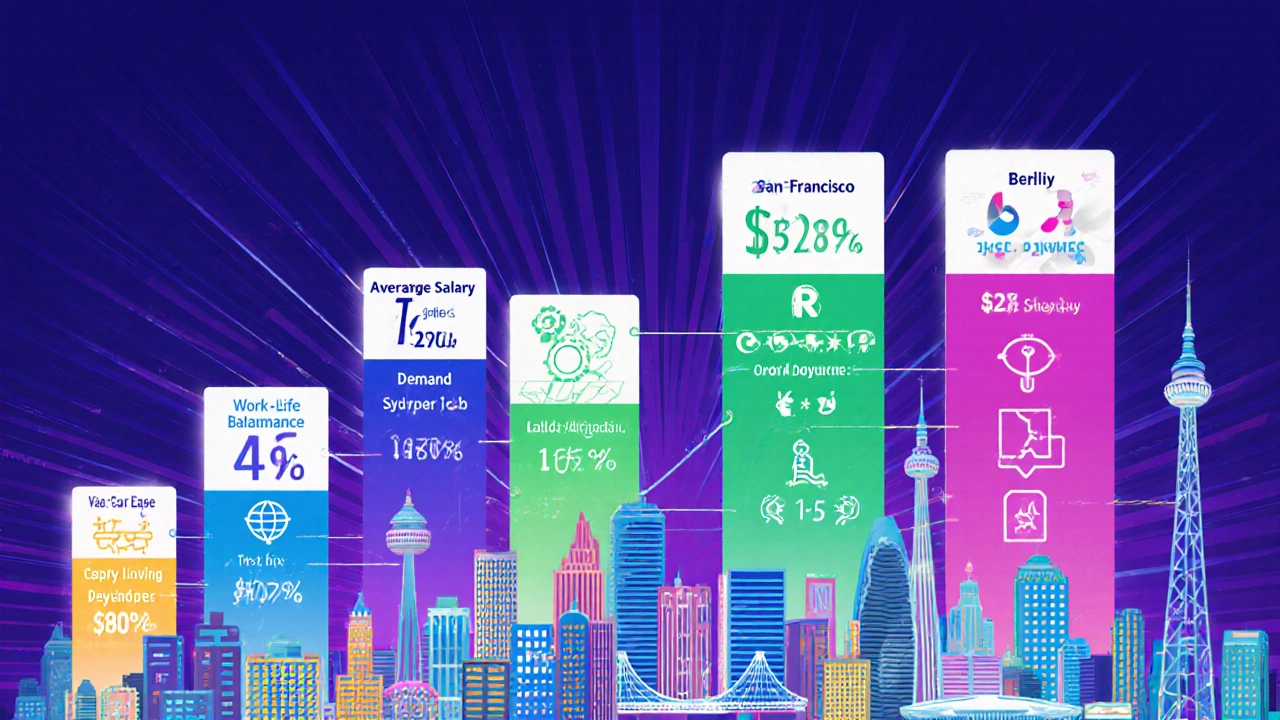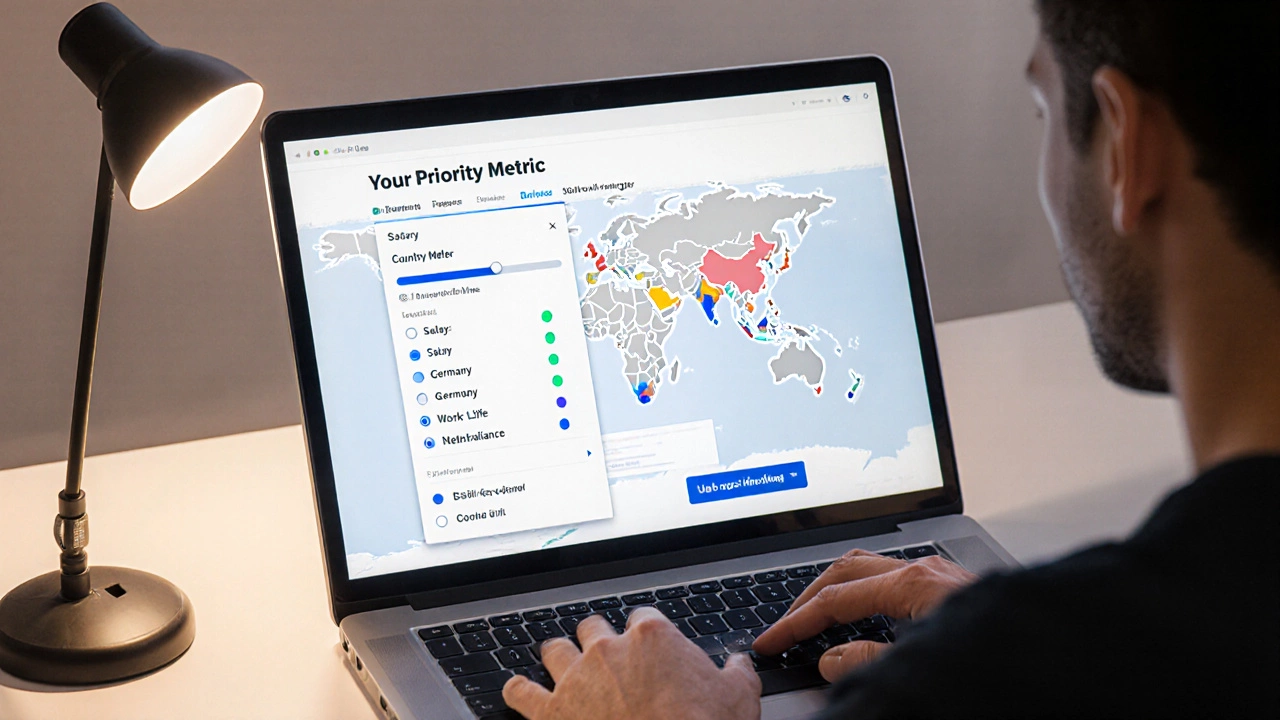Full-Stack Developer Country Selector
Top Matches Based on Your Criteria
This tool compares countries based on five key metrics used in our analysis:
- Average Salary - Mid-level full-stack developer compensation
- Job Demand - Number of open positions per 100,000 tech workers
- Cost of Living - Index compared to New York City (100)
- Visa Ease - Score from 1 (hard) to 5 (easy)
- Work-Life Balance - Composite score from 1 to 5
Adjust your preferences and click "Find Best Match" to see tailored recommendations.
If you’ve been scrolling through job boards and wondering where you could earn more, enjoy a vibrant tech scene, and still have a life outside the screen, you’re not alone. The quest to discover the best country for full-stack developers boils down to a handful of factors: salary, demand, cost of living, visa friendliness, and work‑life balance. Below we break down each factor, compare the top destinations, and give you a roadmap for the move that matches your priorities.
Key Takeaways
- The United States and Switzerland still lead on raw salaries, but Australia and Canada often provide a better overall quality of life.
- Germany and the Netherlands score highest for visa ease and strong developer ecosystems within the EU.
- Singapore punches above its weight in demand and tax efficiency, though the cost of living is steep.
- When cost of living matters most, the United Kingdom and Canada offer a sweet spot of decent pay and affordable housing.
- Remote‑first companies are expanding opportunities worldwide, so you can reap high‑pay benefits without relocating if you choose.
How We Compare Countries
To keep the comparison fair, we looked at five core metrics that matter to most developers:
- Average salary for a mid‑level full‑stack role (converted to USD for consistency).
- Job demand measured by the number of open positions per 100,000 tech workers.
- Cost of living index (Numbeo 2025), where 100 represents NewYork City.
- Visa ease - a score from 1 (hard) to 5 (easy) based on processing time, language requirements, and post‑grant work rights.
- Work‑life balance - a composite score from 1 to 5 derived from average weekly hours, vacation days, and employee satisfaction surveys.
Data comes from government labor reports, Stack Overflow Developer Survey 2024, and independent cost‑of‑living databases.
Country Overviews
United States is the largest market for tech talent, offering the highest average compensation and a dense concentration of startups and Fortune‑500 companies. The visa landscape can be tricky; the H‑1B lottery caps the number of new work permits each year.
Canada combines strong salaries with a points‑based immigration system that favors skilled tech workers, making it one of the easiest places to obtain a work permit.
Germany boasts a robust engineering culture, generous parental leave, and the EU Blue Card, which streamlines residence for high‑skill professionals.
Australia offers a high quality of life, solid salaries, and the Skilled Independent visa (subclass 189) that doesn’t require employer sponsorship.
United Kingdom remains a major tech hub, especially in London and Manchester, with a relatively simple Tier2 (General) visa process for qualified roles.
Singapore serves as Asia’s fintech and cloud‑services gateway, offering tax‑friendly packages and fast‑track tech employment passes.
Netherlands features a thriving startup ecosystem, English‑friendly work environment, and the Highly Skilled Migrant visa that is quick to approve.

Side‑by‑Side Comparison
| Country | Avg Salary (USD) | Demand (jobs/100k) | Cost of Living Index | Visa Ease (1‑5) | Work‑Life Balance (1‑5) |
|---|---|---|---|---|---|
| United States | 115,000 | 48 | 100 | 2 | 3 |
| Canada | 95,000 | 42 | 78 | 5 | 4 |
| Germany | 85,000 | 38 | 70 | 4 | 4 |
| Australia | 90,000 | 35 | 85 | 4 | 5 |
| United Kingdom | 80,000 | 40 | 78 | 3 | 4 |
| Singapore | 100,000 | 45 | 115 | 4 | 3 |
| Netherlands | 88,000 | 36 | 82 | 5 | 4 |
Which Country Wins for Specific Goals?
Highest paycheck: The United States still tops the chart, especially in Silicon Valley and Seattle. If you chase the raw number and are comfortable with a demanding workload, the US is hard to beat.
Best overall quality of life: Australia and Canada combine strong salaries with moderate cost of living and generous vacation policies. Both score a 5 on work‑life balance.
Easiest visa route: Canada’s Express Entry system and the Netherlands’ Highly Skilled Migrant program are streamlined and often approve within weeks.
Most affordable high‑pay: Germany offers a solid salary relative to a lower cost of living, meaning your disposable income can be higher than in the US despite a lower headline figure.
Fast‑growing Asian hub: Singapore delivers tax‑friendly packages and rapid career progression, ideal if you want to tap into Asian markets.
Practical Tips for Making the Move
- Research salary bands early. Use sites like Glassdoor and Levels.fyi to see what peers earn in your target city.
- Factor in taxes and social security. For example, the US federal tax can take 20‑30% of your gross pay, while Canada’s progressive tax system often leaves a similar net after deductions.
- Negotiate relocation assistance. Many large tech firms will cover flight, temporary housing, and visa filing if you ask during the offer stage.
- Plan for cost‑of‑living adjustments. If you move from a low‑cost region to SanFrancisco, a 30% salary bump may still leave you tighter than before.
- Leverage remote‑first policies. If a company allows you to work from anywhere, you can keep your current location while enjoying a US‑level salary.
Next Steps
Start by narrowing down the metric that matters most to you-salary, lifestyle, or visa speed. Then dive into the country’s specific tech meet‑ups, LinkedIn groups, and local recruiter channels. Finally, draft a clear ask for relocation support when you receive an offer; the data above gives you a solid bargaining chip.

Frequently Asked Questions
Do I need a work visa to work remotely for a foreign company?
If you stay in your home country and the employer doesn’t require a physical presence, a visa isn’t needed. However, some firms prefer you to be on a local payroll for tax compliance.
Which country offers the fastest path to permanent residency for developers?
Canada’s Express Entry and Australia’s Skilled Independent visa (subclass 189) both lead to permanent residency after 2‑3 years of work, often faster than the US green‑card process.
How does the cost of living in Berlin compare to SanFrancisco?
Berlin’s index sits around 70, while SanFrancisco is 115. That means housing, groceries, and transport are roughly 40% cheaper in Berlin.
Is the UK still a good choice after Brexit?
Yes. London’s tech salaries have risen, and the new Skilled Worker visa gives points for salary thresholds and English proficiency. The ecosystem remains vibrant.
What’s the average vacation time for developers in Europe?
Most EU countries guarantee at least 20 paid days, with Germany and the Netherlands often offering 25‑30 days plus public holidays.
Should I consider tax implications when choosing a country?
Absolutely. High salaries can be offset by high taxes. For example, a $120k salary in the US may net similarly to a $95k salary in Canada after tax.
